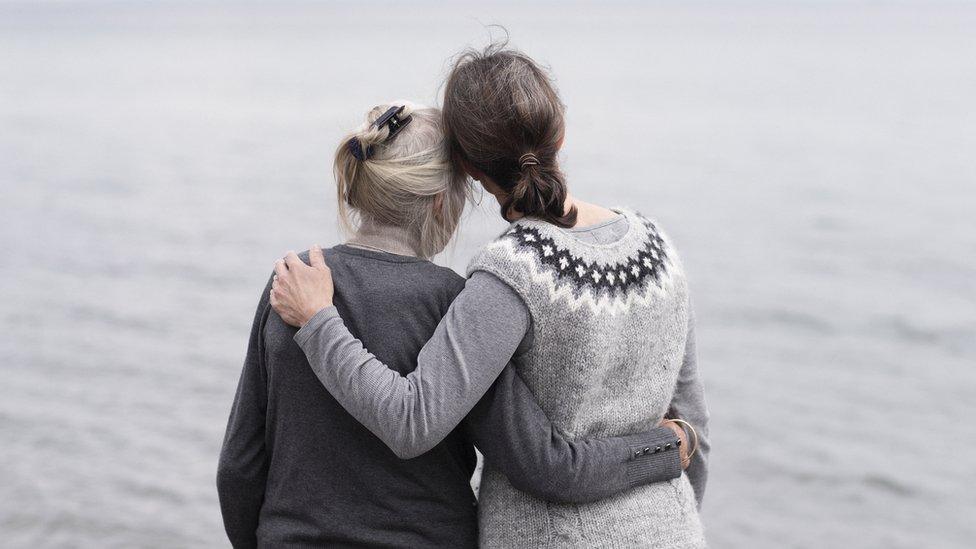'I left my marriage after 55 years of abuse'
- Published

Sarah is now living with her daughter after escaping her abusive marriage (picture posed by models)
Hundreds of thousands of elderly domestic abuse victims have been recorded in a 12-month period. One of them has told how she left her abusive husband in her seventies, after 55 years of marriage.
Sarah* was not allowed to paint her nails, wear perfume or go to bed until her husband, Barry*, came home from the pub.
He never bought her birthday or Christmas presents. His behaviour was so controlling that he would draw a line around objects in the house to check whether she moved them while he was out.
Abuse by Barry, both mental and physical, began two years into their marriage. Never believing she had a way out, Sarah endured it almost daily for more than five decades.
But after once again being accused of moving a household object when he forbade her to do so, Sarah, 73, made up her mind to leave.
She fled more than 100 miles to her daughter's home in the West Midlands. There, she is ready to rebuild her life, free from fear.
"If I have another five years left in me, I am looking forward to doing what I want and being happy," she said.
"I just never thought I could leave and had anywhere to go but you can, so I say to any people in the same situation, 'you can get out and don't do what I did and stay so long'."
The Crime Survey for England and Wales found about 180,000 women aged 60 to 74 were victims of domestic abuse in 2019-2020, and about 98,000 men during the same period.
Finding the strength to leave can be the hardest part and knowing you have to start again at an older age can also be daunting, according to Raj Thind, regional head of the domestic abuse service at Black Country Women's Aid, which has helped Sarah.
"There can be an unpredictability that comes with leaving," Ms Thind said.
"You have some control by staying, you know what the abuse will be at home, but leaving can maybe lead to the victim being stalked and not knowing what extremes the person will go to.
"Also, after so many years of abuse, it can become normalised.. there's a paralysing fear that keeps you stuck to that person."

"You can get out," says Sarah to other women in her situation. "Don't do what I did and stay so long."
Sarah was on the whole not allowed to leave the home she shared with her husband, or if she did, had to return by a specific time. Her family had to make appointments with Barry to see her.
If he worked in the garden, she said she had to sit in the dining room so he could see her through the window. He criticised her constantly, and made no secret he was having affairs.
But one day last year, Sarah decided she could take no more. Over the years, she had been able to keep control of her pension and disability allowance - which helped fund Barry's lifestyle - and managed to save a little money.
'So paranoid'
"Every nerve in my body was going," she said. "I'd just had enough that day."
Barry had gone out after they had an argument, and Sarah told her son, who lived with them, what she was going to do. She packed a bag and the pair ran to a neighbour who called them a taxi to take her to a nearby hotel.
"I was so paranoid. I called the police and was crying and my son was crying and we were looking out the window and waiting," she said.
"The police couldn't come out immediately and we were so scared. In the end, we went to the bus station and caught a bus and then a train to where my daughter lives."
She rang her daughter, Emma*, from a phone box and told her she had left, but believed she was being followed and hung up.
Panicking, Emma filed a missing person report and informed police in her mother's home town. Barry suggested he'd done nothing wrong, and suggested his wife was suffering from a mental illness.
It took a week to find Sarah, who had been moving from B&Bs and hotels with her son.
"My mum was unrecognisable when I went to get her," Emma said.
"She could hardly speak. She was shaking. It was terrible."
'Saved my life'
Sarah said she last saw Barry after being assessed by mental health teams in the days following the reunion with her daughter. They found nothing wrong with her.
"He said he was sorry and that he'd change, just like he always said, but he never did," Sarah said.
He has since made threats against his daughter and made her "look over her shoulder", but has stopped since his wife took out an order on him preventing him from coming near her.
"The help I have since received has been outstanding," Sarah said.
"They've saved my life. I didn't think there was help, but there is."
Ms Thind said there were a number of ways victims of domestic abuse could be helped, even if they were not ready to leave an abusive relationship.
"Often it can be just talking to someone," she said.
"We have women who've said just talking to me helps, 'I will be able to go, but not yet' and you go on a journey with them.
"It's important they know help is there."
*All names have been changed.
If you are affected by domestic abuse, there is a range of services available via the BBC's Action Line page.

Follow BBC West Midlands on Facebook, external, Twitter, external and Instagram, external. Send your story ideas to: newsonline.westmidlands@bbc.co.uk , external